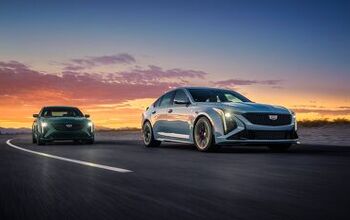QOTD: Are You Willing to Let the Government Ride Shotgun?

It already does, in a sense, but you’re only punished for exceeding a posted speed limit if the long arm of the law catches you in the act.
Flashing lights in the rear-view or a photo radar ticket in the mailbox can ruin our day, but the relative absence of cops and cameras on most roadways means most of us can still “make good time” on our journeys. However, with pedestrian fatalities on the rise (and governments across the country looking for easy fixes), some lawmakers might find inspiration from Europe.
Just the other day, Ronnie told us of the decision by European Parliament to mandate speed limiters on all cars. Are you willing to drive Miss Daisy, all the time, to help your fellow man?
Depending on how negotiations shake out, within three years European drivers could find the government sitting rigidly in the passenger seat, berating their every move.
From Ronnie’s piece:
The speed limiters, which go by the euphemism Intelligent Speed Assistance (ISA), use GPS data and possibly traffic sign recognition to determine a road’s speed limit and then limit engine power to match that speed. While it’s possible to just press harder on the accelerator and go faster, if the car exceeds the speed limit for several seconds, an audible warning signal will sound, along with a visual warning displayed until speed is reduced to the legal limit.
Ever driven that first block without your seatbelt on? Those warnings get annoying in a hurry. It’s possible that some crafty European drivers will find a way to disable the warning, but what if that becomes another offense? What if law enforcement, your local government, and your insurance provider are made aware of speed violations and speed limiter tampering as a way of enforcing proper use? It’s not too wild a thought.
In the pursuit of safety (still a worthwhile goal, don’t get us wrong), many advocates are willing to tout dystopian solutions, and many lawmakers are just as willing to sign on. In Europe, especially. It’s no wonder Black Mirror is a UK program — just look how the country responded to Ford’s Mustang ads.
Here in North America, countless cities have already lowered default speed limits, only to entertain calls for further lowerings. 25 mph, then 20 mph … then what? The heat will soon be on to find a better solution, and the focus of advocates and lawmakers could fall on the vehicle itself.
Is this European experiment a future you’re willing to accept, or is it a step too far?
[Image: Fiat Chrysler Automobiles]

More by Steph Willems
Latest Car Reviews
Read moreLatest Product Reviews
Read moreRecent Comments
- Marcr My wife and I mostly work from home (or use public transit), the kid is grown, and we no longer do road trips of more than 150 miles or so. Our one car mostly gets used for local errands and the occasional airport pickup. The first non-Tesla, non-Mini, non-Fiat, non-Kia/Hyundai, non-GM (I do have my biases) small fun-to-drive hatchback EV with 200+ mile range, instrument display behind the wheel where it belongs and actual knobs for oft-used functions for under $35K will get our money. What we really want is a proper 21st century equivalent of the original Honda Civic. The Volvo EX30 is close and may end up being the compromise choice.
- Mebgardner I test drove a 2023 2.5 Rav4 last year. I passed on it because it was a very noisy interior, and handled poorly on uneven pavement (filled potholes), which Tucson has many. Very little acoustic padding mean you talk loudly above 55 mph. The forums were also talking about how the roof leaks from not properly sealed roof rack holes, and door windows leaking into the lower door interior. I did not stick around to find out if all that was true. No talk about engine troubles though, this is new info to me.
- Dave Holzman '08 Civic (stick) that I bought used 1/31/12 with 35k on the clock. Now at 159k.It runs as nicely as it did when I bought it. I love the feel of the car. The most expensive replacement was the AC compressor, I think, but something to do with the AC that went at 80k and cost $1300 to replace. It's had more stuff replaced than I expected, but not enough to make me want to ditch a car that I truly enjoy driving.
- ToolGuy Let's review: I am a poor unsuccessful loser. Any car company which introduced an EV which I could afford would earn my contempt. Of course I would buy it, but I wouldn't respect them. 😉
- ToolGuy Correct answer is the one that isn't a Honda.


































Comments
Join the conversation
I live in a small town in Mexico. The speed limit on the highway through town is 24 mph. That equates to 40 kmph. The speed limit on streets away from the highway are limited to 20 kmph or 12 miles per hour. No one seems to mind. The 40 kmph speed on the main road is seldom reached as the traffic is bumper to bumper for most of the day. We are 30 miles south of Guadalajara, a city of several million in it's metropolitan area. A number of people from Guadalajara come through town every day causing traffic jams with walking pace traffic. The back streets set at 12 mph are cobblestone and very rough so no one speeds there either. When I take the car going to the other side of town, two miles away, it takes forty minutes to drive it. I usually just jump on the motor scooter and go that way. Two miles in about seven minutes. Two wheels is the way to go in heavy traffic.
I think if ANY laws are enacted, it should be to increase penalties for people not paying attention at the wheel and far better drivers training and adherence to the rules and etiquette.